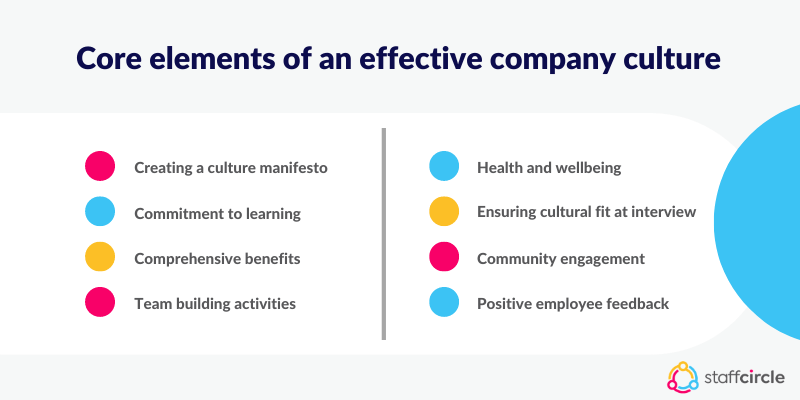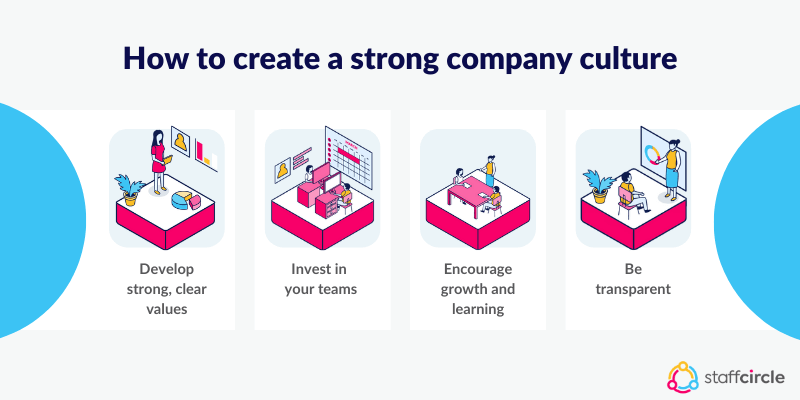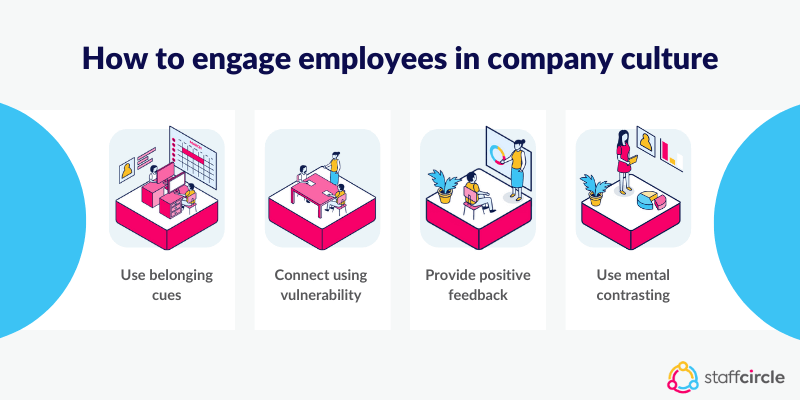As a business owner, you’ve probably heard the phrase ‘company culture’ a lot over the last couple of years. But what does it mean, and how can putting time and money into your wellbeing and corporate culture help to keep staff on board?
You could think of your company culture as your organisation’s personality. Company culture refers to what defines your work environment and includes several elements that revolve around employee engagement:
- Company values
- Mission statement
- Work ethics
- Company expectations
What defines a company’s culture?
Your company’s culture should aim to foster an environment in which innovation can flourish, engaging employees and allowing teams to work together to solve problems and perform beyond expectations.
But what exactly is company culture? It’s a broad, all-encompassing term, so let’s break it down into its core elements and explore how to craft a positive company culture that’s relevant to your business.
Creating an effective organisational culture means drawing upon a set of shared values and behaviours. Your company’s mission contributes to a workplace environment where employees are best able to realise their talents.
While each company has its own unique set of qualities and objectives, there are several crucial ingredients to a successful company culture that can be universally applied, whatever the purpose or size of your company.
Boost retention by improving employee experience
Discover the secrets to creating an irresistible company culture
Core elements of an effective company culture
Company culture is important. Creating an effective company culture is all about building an environment where employees are motivated to overcome challenges, work effectively as a team and provide innovative solutions.
Consider your current company culture. You can incorporate these key elements of corporate cultures to your company’s strategy:
Creating a culture manifesto
Creating a corporate Culture Manifesto is not dissimilar to crafting Mission Statement; clear and concise, it needs to be relevant to your company while inspiring current and prospective employees.
Outlining core values in a simple statement provides a useful road map for your employees.
Ensuring the right cultural fit during interview
Happy employees play a huge part in improving a company’s culture. Make sure that you qualify every job seeker to discover whether they have shared values with your company during the interview process. This helps you to promote a good company culture from the initial point of contact.
With the great resignation a concern for HR leaders, confirming that a potential employee’s personal values align with your company’s values is a great way to boost engagement.
Comprehensive workplace benefits
Bonuses, take-aways for working overtime and free beer are obvious ways to encourage commitment from your employees, but treats alone aren’t enough to entice the best people to commit to your company. Workplace benefits need to be aligned with the core values of the company while offering something to enhance the happiness of your team members.
Comprehensive leave, flexible schedules and reimbursement for tuition and other training all combine to attract and retain the best talent available.

Team building activities
A successful and innovative company culture only occurs when the team members are working in synch with one another, so creating a fun, engaging and rewarding environment for everyone is essential for strengthening relationships between your employees.
Offering a diverse range of team-building exercises – from outdoor activities and charity fundraising, to informal evenings relaxing with a few drinks – works towards building a workplace culture where employees feel connected and engaged with one another.
Health and wellbeing
Providing employees with health, dental and life insurance policies is just one step towards demonstrating your company is committed to their health and well-being, but it doesn’t stop there. Investing in an on-site gym or offering discounted gym memberships, providing healthy food alternatives in the cafeteria or offering classes in pass-times such as yoga, meditation and other wellness programs will ensure your employees are healthier while reassuring them that your company cares about their well-being.
Commitment to learning
Demonstrating a commitment to the professional growth of your employees by providing them with the necessary training tools is a clear indication you care about the future of their careers, both within your company and beyond.
Access to the resources required for them to enhance their skills or develop new ones, whether it’s online programs, internally maintained tutorials or management training courses, will ensure your team members don’t stagnate and stay on top of the latest industry trends.
Supporting the community
A successful company should strive to be a part of a successful wider community, in touch with the local issues concerning its employees and actively involved in providing solutions. Hosting charity events, providing grants for charitable foundations and other philanthropic endeavours helps to boost employee morale while improving your business’s profile and core values.
Positive employee feedback
It doesn’t matter what measures you put in place to implement a healthy culture if you don’t listen to your employees. A truly effective workplace culture needs to dynamically reflect the requirements of your staff, and regular, effective feedback is the only way to guarantee you’re adapting to changes.
Creating an environment where employee feedback is highly valued and encourage means your corporate culture will flag any potential problems before they become serious while providing employees with a clear sense of engagement with your company’s core values and objectives.
How a positive company culture attracts and retains employees
Your company culture has the power to make or break your business, especially when it comes to retention.
That’s because a positive company culture breeds a sense of loyalty among employees. If they feel that they are treated well and with respect, and enjoy coming to work every day, they’re much more likely to stay with you.
Poor company culture will have the opposite effect. Your employees will have low morale, and any employee happiness will be short-lived if your culture doesn’t remain at the heart of your business. If this sounds like your current culture, it’s definitely worth investing in a work environment overhaul.
Investing in your employees’ well-being is essential if you want a team of happy, dedicated staff. A strong culture can also help to reduce workplace stress, which will both boost staff health and reduce absenteeism rates. What’s more, higher retention rates mean you won’t have to keep spending money on hiring new staff and training them up.
Even simple things like showing a duty of care can be a step in the right direction. But there are many ways to invest in your company culture to ensure your team is happy, motivated and unlikely to look elsewhere for a new job.
How to create a strong company culture that employees will want to adopt
When first understanding company culture, improving employee engagement and developing creating a positive work environment it can be easy to look for quick wins. Some human resources departments may think that the key to employee satisfaction is providing a free lunch, donning the office with a ping-pong table or placing a games console in a meeting room.
Whilst these perks may well work towards improving the employee experience, great company culture needs to be built on a more substantial foundation in order to improve employee retention.
Your staff want to work for a company that believes in them and demonstrates employee recognition openly. They want to be treated with respect and be proud of the company they work for, which means you need to create an environment that caters for those needs. You can do this through the following means:
Develop strong, clear values
Make sure your values are easy to remember and embrace. They should always be in line with your company mission and be backed up by your incentive structure.
Values should drive company culture because they give your organisation its identity. If your staff don’t know what your values are, it won’t be clear to them what your company cares about. Bringing your company values in line with those of your employees will help to build a cohesive workforce that works as a foundation for your corporate culture.

Encourage growth and learning opportunities
Every employee will have a plethora of skills and talents, so you should be making the most of them! Providing the appropriate training and resources will help your staff to expand their existing capabilities.
Personal growth is essential for ensuring your employees reach a high level of fulfilment, as it sees them unlocking their full potential. In addition, helping your staff get better at their jobs demonstrates that you care about them on a personal level as well as a professional one, which in turn leads to a stronger company culture.
Invest in your teams
As we’ve established, a good culture highlights that you value your staff as people, rather than just employees.
Providing benefits such as flexible working hours, additional paid leave and educational reimbursement shows that you care about your employees’ work-life balance. This, in turn, improves employee engagement and builds loyalty and trust between you and your staff.
Be transparent
You can encourage open communication by involving your teams in decision-making and being transparent about what goes on within the company.
A good starting point is by asking your staff about what they’d like more information about, or any frustrations they currently have at work.
How to make sure your corporate culture evolves with your business
Remember, building a strong company culture takes time. Don’t give up if it doesn’t happen overnight. By focusing on your company’s vision, incorporating strong values, engaged, motivated employees, and a feeling of trust throughout the organisational structure, you will build a dynamic culture that improves your business.
When your company’s culture is successful, make sure to keep it relevant. It takes time to embed culture changes, so introducing a new value proposition every few months will harm your efforts.
Instead, review your culture and values every few years, or during each growth phase. This way, you’ll be able to keep your culture relevant to your business’ current standing.
How to engage employees in your company culture
In order to create an atmosphere where ideas can be freely exchanged, you’ll need to establish a corporate culture where your employees feel safe.
Use belonging cues
Belonging cues help to foster a feeling of psychological safety, creating energy in the exchanges between leaders and team members, while treating them as unique and valuable and signalling the future orientation.
Belonging cues include regular eye contact, open body language, mimicry (or pacing), proximity, attention and turn-taking. The key to using belonging cues effectively is to use them frequently; our unconscious brains are obsessed with the notion of psychological safety, so the more signals we receive which tell us we’re in a safe space, the more relaxed and forthcoming we are with our communication.
Connect people using vulnerability and weakness
One of the most common reasons why people refrain from interacting in a group is the prospect of being wrong or saying something which they think is cause for embarrassment.
While it might seem counter-intuitive to bring vulnerability and weakness to the foreground, doing it in the right way helps to establish that everyone in the group is prone to these insecurities, opening them up to share vulnerabilities and help one another.
A common mistake is to think that trust comes after vulnerability, but the truth is by showing vulnerability first you can help to build a stronger team and drive creativity and innovation.

Provide positive, affirming feedback
The way feedback and criticism is framed can make the difference between disappointment and improvement. Striking a balance between delivering harsh truths without sacrificing motivation can be tricky.
A study from Gallup revealed that employees with senior leaders who focused on their strengths were far more likely to be engaged with their work than those with managers who focused on their weaknesses. Effective leadership development can improve the colleague / manager relationship.
Use mental contrasting
If you want your company’s culture to foster higher purpose and productivity, setting up mental contrasting signals can trigger significant changes in both behaviour and outcomes. What is surprising about mental contrasting is how simple it is, requiring two basic points of reference: what is the goal? What are the obstacles?
The principle isn’t limited to individuals; when groups adopt the same practices and envision a shared goal and obstacles, the same positive outcomes occur.
In summary
So, what is company culture? It’s the personality of your organisation. It’s more than just a mission statement or set of values on paper – it’s how those things are put into practice every day.
Company culture should aim to create an environment where employees feel engaged and can work together to achieve common goals.





